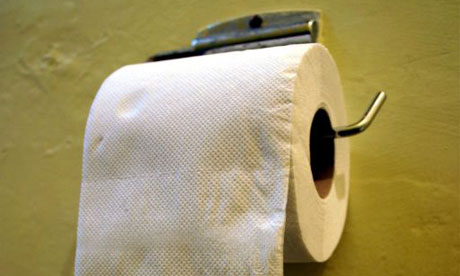Citation du jour 
Par des citations on affiche son érudition, on sacrifie son originalité.
Arthur Schopenhauer
Le problème majeur ? L'insistance du public américain pour les produits extradoux, matelassé et à multiples épaisseurs lorsqu'il est temps de passer à la toilette.
«C'est un produit que l'on utilise moins de trois secondes et les conséquences écologiques de sa fabrication sur les forêts sont énormes», soutient Allen Hershkowitz, un scientifique du Natural Resources Defence Counsil.
Par des citations on affiche son érudition, on sacrifie son originalité.
Arthur Schopenhauer
La sensibilité des Américains pour leurs tendres fesses cause plus de dommages environnementaux que l'amour de nos voisins du Sud pour leurs voitures hyper consommatrices d'essence, le fast-food ou leurs immenses maisons, selon des écologistes.
Le problème majeur ? L'insistance du public américain pour les produits extradoux, matelassé et à multiples épaisseurs lorsqu'il est temps de passer à la toilette.
«C'est un produit que l'on utilise moins de trois secondes et les conséquences écologiques de sa fabrication sur les forêts sont énormes», soutient Allen Hershkowitz, un scientifique du Natural Resources Defence Counsil.
American taste for soft toilet roll 'worse than driving Hummers'
Extra-soft, quilted and multi-ply toilet roll made from virgin forest causes more damage than gas-guzzlers, fast food or McMansions, say campaigners

"This is a product that we use for less than three seconds and the ecological consequences of manufacturing it from trees is enormous," said Allen Hershkowitz, a senior scientist at the Natural Resources Defence Council.
"Future generations are going to look at the way we make toilet paper as one of the greatest excesses of our age. Making toilet paper from virgin wood is a lot worse than driving Hummers in terms of global warming pollution." Making toilet paper has a significant impact because of chemicals used in pulp manufacture and cutting down forests.
A campaign by Greenpeace seeks to raise consciousness among Americans about the environmental costs of their toilet habits and counter an aggressive new push by the paper industry giants to market so-called luxury brands.
More than 98% of the toilet roll sold in America comes from virgin forests, said Hershkowitz. In Europe and Latin America, up to 40% of toilet paper comes from recycled products. Greenpeace this week launched a cut-out-and-keep ecological ranking of toilet paper products.
"We have this myth in the US that recycled is just so low quality, it's like cardboard and is impossible to use," said Lindsey Allen, the forestry campaigner of Greenpeace.
The campaigning group says it produced the guide to counter an aggressive marketing push by the big paper product makers in which celebrities talk about the comforts of luxury brands of toilet paper and tissue.
Those brands, which put quilting and pockets of air between several layers of paper, are especially damaging to the environment.
Paper manufacturers such as Kimberly-Clark have identified luxury brands such as three-ply tissues or tissues infused with hand lotion as the fastest-growing market share in a highly competitive industry. Its latest television advertisements show a woman caressing tissue infused with hand lotion.
The New York Times reported a 40% rise in sales of luxury brands of toilet paper in 2008. Paper companies are anxious to keep those percentages up, even as the recession bites. And Reuters reported that Kimberly-Clark spent $25m in its third quarter on advertising to persuade Americans against trusting their bottoms to cheaper brands.
But Kimberly-Clark, which touts its green credentials on its website, rejects the idea that it is pushing destructive products on an unwitting American public.
Dave Dixon, a company spokesman, said toilet paper and tissue from recycled fibre had been on the market for years. If Americans wanted to buy them, they could.
"For bath tissue Americans in particular like the softness and strength that virgin fibres provides," Dixon said. "It's the quality and softness the consumers in America have come to expect."
Longer fibres in virgin wood are easier to lay out and fluff up for a softer tissue. Dixon said the company used products from sustainbly farmed forests in Canada.
Americans already consume vastly more paper than any other country — about three times more per person than the average European, and 100 times more than the average person in China.
Barely a third of the paper products sold in America are from recycled sources — most of it comes from virgin forests.
"I really do think it is overwhelmingly an American phenomenom," said Hershkowitz. "People just don't understand that softness equals ecological destruction."
Aucun commentaire:
Publier un commentaire